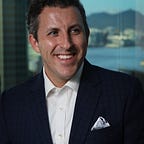From Quarantine to Vaccine in a Week
For the past six days, my home was room 176–08 in Penny Bay Quarantine Center. Last weekend, the Hong Kong Health Department told me I had a “close contact” with someone with the virus on March 6 and would need to quarantine for a week until 14 days had passed since that contact, or today, March 20. The contact was in passing, we were both wearing masks, I had no symptoms, and I was not tested until I entered quarantine. Nevertheless, I was whisked off in a van and spent the last week in a room I am prohibited from leaving.
The room is comfortable: big, clean, and has hot water and air conditioning. It is far nicer than many of the hostels and hotels I’ve paid for and probably about as nice as my freshman year dorm room (it definitely smells better). The food wasn’t bad, and my wife sent me off with a suitcase of snacks. I spent my week much the way I normally spend my time: Work, never-ending Zoom meetings, podcasts, yoga, books, and Netflix (Peaky Blinders FTW).
In the last year, Hong Kong has quarantined about 40,000 people the same way I was, a seemingly heavy-handed approach, especially for people like me who tested negative for the virus. And for those who have been forced to quarantine with young children or separated from their children completely, the policy feels particularly harsh. Overall, though, Hong Kong’s virus response has been successful. About 10,000 people got the virus, 200 people have died, all while keeping some semblance of normalcy for much of the year. The recent outbreak that threatened to expand rapidly through the crowded city appears contained, in part because they locked up people like me. Today Hong Kong had just eight new cases.
If you asked me at the beginning of 2020 whether I would be willing to spend one week in comfortable isolation in exchange for a year where I could still go to restaurants, beaches, bars, gym, the office, even throw parties, I would take that deal. But the loss of freedom was wrenching when someone in a hazmat suit knocks on your door to take you away to a government camp. I don’t pretend to know the balance between freedom and security, especially in a pandemic. Still, the theoretical balance of individual liberty vs. public health suddenly got a lot less theoretical for me, especially in the backdrop of a rapidly changing city with polarized politics.
None of this is a bid for sympathy. In a year of hardship for so many, my week of isolation scarcely registers as an inconvenience, especially given my life of outsized privilege (in both the classical and contemporary definition of the word). The experience will quickly fade into a minor tale in a year of many upended expectations. If anything, I am grateful for an opportunity to reflect on the importance of my own freedom and health, a deeper empathy for the countless people unjustly imprisoned, the importance of the rule of law, and how best to spend my finite time, energy, and resources in a rapidly changing world.
Plus, there is a good reason for optimism. The day after my release, I got my first shot of the vaccine, for free, and courtesy of the same Hong Kong government that quarantined me. Hong Kong relaxed the requirements for who can get the vaccine on Monday, and by Tuesday there was a website where you could sign up, and by Thursday an expanded set of people were getting the vaccine. The process was convenient and free.
The vaccine itself represents a balance of individual liberty and collective good: I protect both myself and the community from the virus by getting vaccinated. Moreover, it is a breath-taking accomplishment of human ingenuity and a testament to our collective ability to solve seemingly overwhelming problems.
